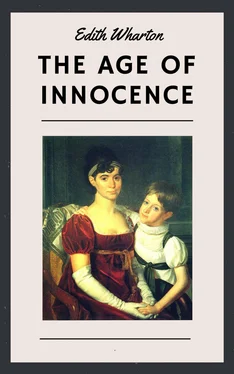Archer was distinctly nervous. He had not gone back to his club after the Opera (as the young bloods usually did), but, the night being fine, had walked for some distance up Fifth Avenue before turning back in the direction of the Beauforts' house. He was definitely afraid that the Mingotts might be going too far; that, in fact, they might have Granny Mingott's orders to bring the Countess Olenska to the ball.
From the tone of the club box he had perceived how grave a mistake that would be; and, though he was more than ever determined to "see the thing through," he felt less chivalrously eager to champion his betrothed's cousin than before their brief talk at the Opera.
Wandering on to the bouton d'or drawing-room (where Beaufort had had the audacity to hang "Love Victorious," the much-discussed nude of Bouguereau) Archer found Mrs. Welland and her daughter standing near the ball-room door. Couples were already gliding over the floor beyond: the light of the wax candles fell on revolving tulle skirts, on girlish heads wreathed with modest blossoms, on the dashing aigrettes and ornaments of the young married women's coiffures, and on the glitter of highly glazed shirt-fronts and fresh glace gloves.
Miss Welland, evidently about to join the dancers, hung on the threshold, her lilies-of-the-valley in her hand (she carried no other bouquet), her face a little pale, her eyes burning with a candid excitement. A group of young men and girls were gathered about her, and there was much hand-clasping, laughing and pleasantry on which Mrs. Welland, standing slightly apart, shed the beam of a qualified approval. It was evident that Miss Welland was in the act of announcing her engagement, while her mother affected the air of parental reluctance considered suitable to the occasion.
Archer paused a moment. It was at his express wish that the announcement had been made, and yet it was not thus that he would have wished to have his happiness known. To proclaim it in the heat and noise of a crowded ball-room was to rob it of the fine bloom of privacy which should belong to things nearest the heart. His joy was so deep that this blurring of the surface left its essence untouched; but he would have liked to keep the surface pure too. It was something of a satisfaction to find that May Welland shared this feeling. Her eyes fled to his beseechingly, and their look said: "Remember, we're doing this because it's right."
No appeal could have found a more immediate response in Archer's breast; but he wished that the necessity of their action had been represented by some ideal reason, and not simply by poor Ellen Olenska. The group about Miss Welland made way for him with significant smiles, and after taking his share of the felicitations he drew his betrothed into the middle of the ball-room floor and put his arm about her waist.
"Now we shan't have to talk," he said, smiling into her candid eyes, as they floated away on the soft waves of the Blue Danube.
She made no answer. Her lips trembled into a smile, but the eyes remained distant and serious, as if bent on some ineffable vision. "Dear," Archer whispered, pressing her to him: it was borne in on him that the first hours of being engaged, even if spent in a ball-room, had in them something grave and sacramental. What a new life it was going to be, with this whiteness, radiance, goodness at one's side!
The dance over, the two, as became an affianced couple, wandered into the conservatory; and sitting behind a tall screen of tree-ferns and camellias Newland pressed her gloved hand to his lips.
"You see I did as you asked me to," she said.
"Yes: I couldn't wait," he answered smiling. After a moment he added: "Only I wish it hadn't had to be at a ball."
"Yes, I know." She met his glance comprehendingly. "But after all—even here we're alone together, aren't we?"
"Oh, dearest—always!" Archer cried.
Evidently she was always going to understand; she was always going to say the right thing. The discovery made the cup of his bliss overflow, and he went on gaily: "The worst of it is that I want to kiss you and I can't." As he spoke he took a swift glance about the conservatory, assured himself of their momentary privacy, and catching her to him laid a fugitive pressure on her lips. To counteract the audacity of this proceeding he led her to a bamboo sofa in a less secluded part of the conservatory, and sitting down beside her broke a lily-of-the-valley from her bouquet. She sat silent, and the world lay like a sunlit valley at their feet.
"Did you tell my cousin Ellen?" she asked presently, as if she spoke through a dream.
He roused himself, and remembered that he had not done so. Some invincible repugnance to speak of such things to the strange foreign woman had checked the words on his lips.
"No—I hadn't the chance after all," he said, fibbing hastily.
"Ah." She looked disappointed, but gently resolved on gaining her point. "You must, then, for I didn't either; and I shouldn't like her to think—"
"Of course not. But aren't you, after all, the person to do it?"
She pondered on this. "If I'd done it at the right time, yes: but now that there's been a delay I think you must explain that I'd asked you to tell her at the Opera, before our speaking about it to everybody here. Otherwise she might think I had forgotten her. You see, she's one of the family, and she's been away so long that she's rather—sensitive."
Archer looked at her glowingly. "Dear and great angel! Of course I'll tell her." He glanced a trifle apprehensively toward the crowded ball-room. "But I haven't seen her yet. Has she come?"
"No; at the last minute she decided not to."
"At the last minute?" he echoed, betraying his surprise that she should ever have considered the alternative possible.
"Yes. She's awfully fond of dancing," the young girl answered simply. "But suddenly she made up her mind that her dress wasn't smart enough for a ball, though we thought it so lovely; and so my aunt had to take her home."
"Oh, well—" said Archer with happy indifference. Nothing about his betrothed pleased him more than her resolute determination to carry to its utmost limit that ritual of ignoring the "unpleasant" in which they had both been brought up.
"She knows as well as I do," he reflected, "the real reason of her cousin's staying away; but I shall never let her see by the least sign that I am conscious of there being a shadow of a shade on poor Ellen Olenska's reputation."
In the course of the next day the first of the usual betrothal visits were exchanged. The New York ritual was precise and inflexible in such matters; and in conformity with it Newland Archer first went with his mother and sister to call on Mrs. Welland, after which he and Mrs. Welland and May drove out to old Mrs. Manson Mingott's to receive that venerable ancestress's blessing.
A visit to Mrs. Manson Mingott was always an amusing episode to the young man. The house in itself was already an historic document, though not, of course, as venerable as certain other old family houses in University Place and lower Fifth Avenue. Those were of the purest 1830, with a grim harmony of cabbage-rose-garlanded carpets, rosewood consoles, round-arched fire-places with black marble mantels, and immense glazed book-cases of mahogany; whereas old Mrs. Mingott, who had built her house later, had bodily cast out the massive furniture of her prime, and mingled with the Mingott heirlooms the frivolous upholstery of the Second Empire. It was her habit to sit in a window of her sitting-room on the ground floor, as if watching calmly for life and fashion to flow northward to her solitary doors. She seemed in no hurry to have them come, for her patience was equalled by her confidence. She was sure that presently the hoardings, the quarries, the one-story saloons, the wooden green-houses in ragged gardens, and the rocks from which goats surveyed the scene, would vanish before the advance of residences as stately as her own—perhaps (for she was an impartial woman) even statelier; and that the cobble-stones over which the old clattering omnibuses bumped would be replaced by smooth asphalt, such as people reported having seen in Paris. Meanwhile, as every one she cared to see came to HER (and she could fill her rooms as easily as the Beauforts, and without adding a single item to the menu of her suppers), she did not suffer from her geographic isolation.
Читать дальше












